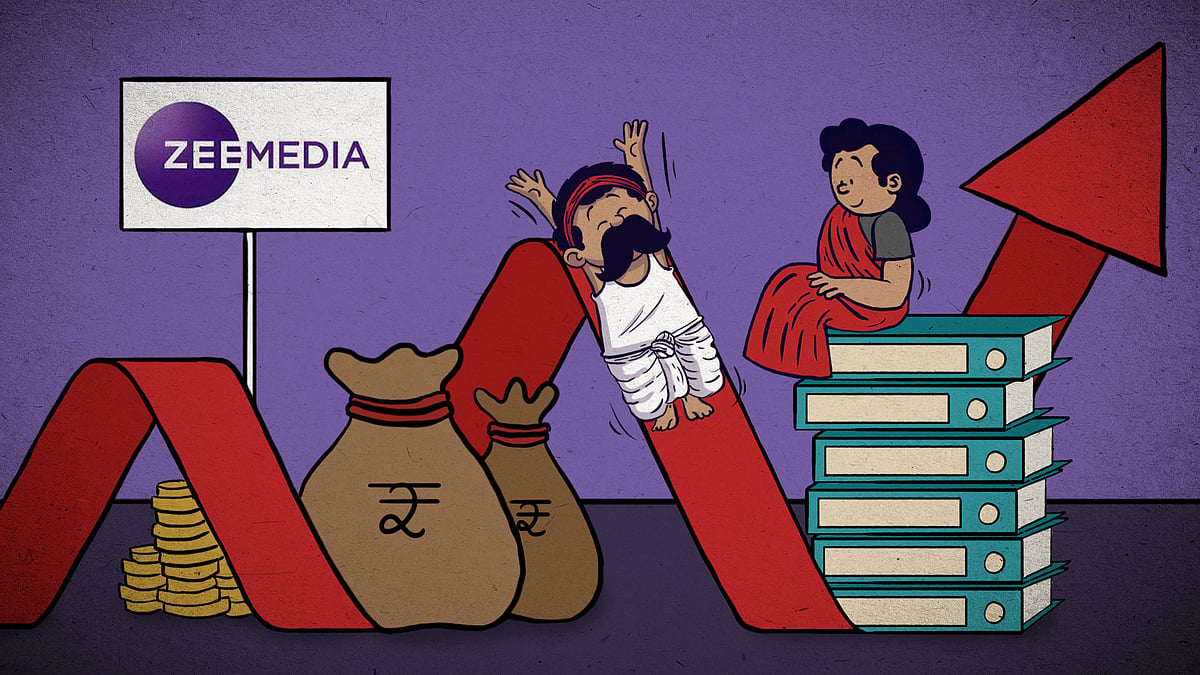Watching the watchdog: How have Rajya Sabha members with media backgrounds fared?
Do they use their positions to spotlight issues related to the media? Not quite.
As a storm rages through the monsoon session of the Rajya Sabha, with the government refusing to allow a debate on the Pegasus leaks, now is as good a time as any to reflect on the significance of the house.
Composed of a rather eclectic mix of personalities from varying fields, including the media, the Rajya Sabha’s legacy is largely attributed to it being a “melting pot of culture and diversity” that provides a platform for talent and expertise aimed at securing greater executive accountability. A letter to the Hindu on the relevance of the Rajya Sabha rightly referred to the upper house of the Parliament as a “watchdog” that must assert itself as a house of correction.
Now, the media is the watchdog of all affairs of government and polity. So, what happens when members of the media themselves join the Rajya Sabha as members?
In 2018, journalist Sevanti Ninan wrote that every time a media owner or journalist is nominated to the Rajya Sabha, “it evokes a passing bout of hand-wringing over journalistic independence”.
“But look closer,” she wrote, “and you find that it is more a case of confirming an ideological or political affiliation that was already there, or of a professional journalist who for her/his own reasons is ready to move into politics for the solutions she/he thinks it offers.”
Newslaundry decided to examine some of those Rajya Sabha members who were formerly connected to the media.
Subhash Chandra
In her piece, Ninan had written about Zee Group founder Subhash Chandra joining the Rajya Sabha and pointed how “how entrenched his media house” was with the governing Bharatiya Janata Party.
Chandra has been a member of the Rajya Sabha for five years now. He won the election to the house in 2016 as an independent candidate backed by the BJP.
Since then, Chandra has asked 10 questions in the house and participated in six debates, though none of these were related to the media. His attendance at the Rajya Sabha stands at 54 percent – far better than Sachin Tendulkar’s abysmal eight percent record – while the national average of attendance is 78 percent. He recorded his lowest attendance of 17 percent during the winter session of 2018.
Chandra’s first question in the house was in 2016 on the auction process of diamond mines, followed by questions on rural development schemes, clinical trials on ayurvedic medicines, and a campaign to clean the Ganga river. His first debate in 2016 was about the Ram Mandir case in the Supreme Court.
He also asked a question on details pertaining to corporate houses or companies that have been chargesheeted for criminal offences, and whether there had been a restructuring or waiver of his debts. This was in 2016, two years before his own group struggled with high levels of debts and defaults. Last week, however, Chandra claimed he had settled “91.2 percent of our total debt to 43 lenders in 110 accounts”.
Shobana Bhartia
Bhartia is the chairperson and editorial director of HT Media. She was nominated to the Rajya Sabha in 2006 and has asked 590 questions during her tenure, a number of which were related to the media.
In 2009, for instance, Bhartia asked the information and broadcasting ministry about whether the government “has recently decided to take away the powers of the Prasar Bharati board”. She directed 32 questions in total to the ministry, including asking it to set up a group of ministers to look into “paid news”. She also asked questions on data and privacy protection, irregularities in awarding telecast rights and contracts, and the setting up of the Broadcast Regulatory Authority of India.
Harivansh Narajan Singh
Singh is a former journalist who has worked with publications like the Times of India and Prabhat Khabar. He also served as the additional media advisor to former prime minister Chandra Shekhar.
Singh has been a member of the Rajya Sabha since 2014 and is currently its incumbent deputy chairman. During his seven-year run, he has participated in 110 debates and asked 518 questions. While the range of issues he has discussed spans a broad spectrum – including safety of whistleblowers, right to education, and the transgender bill – he directed 13 questions to the information and broadcasting ministry on issues like budget allocation on advertisements, restricting private media channels from one-sided publicity, and the betterment of Prasar Bharati.
Rajeev Chandrashekhar
Chandrashekhar is the founder of Asianet News Online Private Ltd, which holds news outlets like Asianet News, Suvarna News and Newsable. Chandrashekhar had also briefly invested in ARG Outlier Media, the holding company of Republic TV.
A three-term member of the Rajya Sabha since 2006, Chandrashekhar has raised 1,087 questions in the upper house. These include questions on social media, net neutrality, and internet accessibility. He has directed only five questions to the information and broadcasting ministry.
In 2017 he asked if the government was aware that foreign media
organisations were “deliberately or inadvertently misreporting the counter-terrorism operations” and how it planned to prevenet “misreporting”. He also participated in a discussion to amend the Cinematograph Act, raised a recruitment scam in Doordarshan, and asked for government guidelines for the live coverage of sensitive incidents.
Swapan Dasgupta
Dasgupta is a journalist who has held several editorial positions in publications such as the Indian Express, Times of India, Statesman and India Today. He was renominated to the house by resident Ram Nath Kovind a month after he resigned from the Rajya Sabha and unsuccessfully contested the West Bengal assembly election on a BJP ticket.
Dasgupta was initially nominated to the Rajya Sabha in April 2016 and his original term was set to expire in 2022. According to Rajya Sabha regulations, the president is empowered to nominate 12 people to the house “from amongst persons who have special knowledge or practical experience in respect of such matters as literature, science, art and social service”.
The Rajya Sabha website states: “By nominating them to Rajya Sabha, the State not only recognises their merit and confers honour on them, but also enables them to enrich the debates by their expertise and knowledge that they have in different areas.”
Dasgupta has participated in 46 debates during his two terms, but has not asked a single question. None of the debates pertained to matters of the media, an area in which he has significant “special knowledge”, as per the Rajya Sabha website. Among the issues that he discussed were the misuse of and algorithmic bias on social media platforms, attack on religious freedom in West Bengal, and the Citizenship Amendment Bill.
While there is no legal or constitutional precedent that can push media personalities such as Dasgupta or Chandra to take on the responsibility of raising issues pertaining to their profession, their silence does speak volumes.
 Who owns your media: How Subhash Chandra’s zeal for diversification wrecked his Zee empire
Who owns your media: How Subhash Chandra’s zeal for diversification wrecked his Zee empire Rajya Sabha TV ex-employees move high court against their termination
Rajya Sabha TV ex-employees move high court against their termination